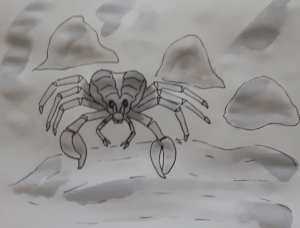Difference between revisions of "Stone Scabs"
From World of Entorais Wiki
Jump to navigationJump to searchm (→Behaviour: formatting) |
m (Text replacement - "Sub-Species" to "Notable Sub-Species") |
||
| (2 intermediate revisions by the same user not shown) | |||
| Line 1: | Line 1: | ||
= | [[File:cave_crab.png|thumb|right|100x|Cave Crab - "Sebastian Romu" © 2019]] | ||
==About== | |||
;Common Names:Cave Crabs, Stone Scabs | ;Common Names:Cave Crabs, Stone Scabs | ||
:Cave crabs, or stone scabs, are a variety of land crab which are nocturnal scavengers. In dry climates they can be an indicator of a hidden or underground watersource. | :Cave crabs, or stone scabs, are a variety of land crab which are nocturnal scavengers. In dry climates they can be an indicator of a hidden or underground watersource. | ||
=Description= | ==Description== | ||
;Classification:Arthropod | ;Classification:Arthropod | ||
;Size: | ;Size: | ||
| Line 10: | Line 11: | ||
;Variance: <!--any other variance, include subspeciation--> | ;Variance: <!--any other variance, include subspeciation--> | ||
=Ecology= | ==Ecology== | ||
;Habitat:Tropical to temperate latitudes, Rocky terrain, containing underground caves, piles of lose scree, or containing crevices an holes they can retreat into by day. A nearby source of freshwater. | ;Habitat:Tropical to temperate latitudes, Rocky terrain, containing underground caves, piles of lose scree, or containing crevices an holes they can retreat into by day. A nearby source of freshwater. | ||
;Diet:Scavenging omnivores, eating a variety of mosses, fungi, algae, plants, and carrion. | ;Diet:Scavenging omnivores, eating a variety of mosses, fungi, algae, plants, and carrion. | ||
=Behaviour= | ==Behaviour== | ||
;Social Grouping:Found in groups numbering up to dozens of individuals, but without a notable pattern. | ;Social Grouping:Found in groups numbering up to dozens of individuals, but without a notable pattern. | ||
;Temperament:Skittish. | ;Temperament:Skittish. | ||
| Line 20: | Line 21: | ||
;Reproduction:<!--method, cycles, associated behaviours--> | ;Reproduction:<!--method, cycles, associated behaviours--> | ||
=Sub-Species= | ==Notable Sub-Species== | ||
<!--list of sub-species with notable differences--> | <!--list of sub-species with notable differences--> | ||
=Domestication= | ==Domestication== | ||
;General:Generally not a prolific breeder, and slow growing, making them unsuitable for domesticated farming, but some are hunted or trapped for food. | ;General:Generally not a prolific breeder, and slow growing, making them unsuitable for domesticated farming, but some are hunted or trapped for food. | ||
;Resources:Meat, Shells. | ;Resources:Meat, Shells. | ||
=See Also= | ==Stories== | ||
<div style="column-count:3;-moz-column-count:3;-webkit-column-count:3"> | |||
</div> | |||
==See Also== | |||
<!--links to related material--> | <!--links to related material--> | ||
[[Category:Arthropod]] | [[Category:Arthropod]] | ||
[[Category:Fauna]] | [[Category:Fauna]] | ||
Latest revision as of 01:36, 20 April 2023
About
- Common Names
- Cave Crabs, Stone Scabs
- Cave crabs, or stone scabs, are a variety of land crab which are nocturnal scavengers. In dry climates they can be an indicator of a hidden or underground watersource.
Description
- Classification
- Arthropod
- Size
- Appearance
- Stony grey crustaceans, In live cave networks they can develop a hardened crust of mineralization making them more easily camouflaged in their habitat.
- Sexual Dimorphism
- Variance
Ecology
- Habitat
- Tropical to temperate latitudes, Rocky terrain, containing underground caves, piles of lose scree, or containing crevices an holes they can retreat into by day. A nearby source of freshwater.
- Diet
- Scavenging omnivores, eating a variety of mosses, fungi, algae, plants, and carrion.
Behaviour
- Social Grouping
- Found in groups numbering up to dozens of individuals, but without a notable pattern.
- Temperament
- Skittish.
- Intelligence
- Animal
- Reproduction
Notable Sub-Species
Domestication
- General
- Generally not a prolific breeder, and slow growing, making them unsuitable for domesticated farming, but some are hunted or trapped for food.
- Resources
- Meat, Shells.
